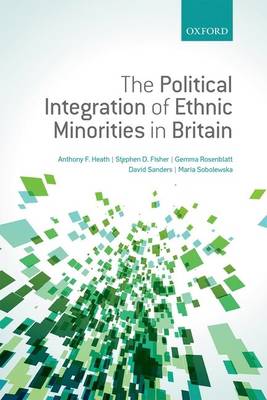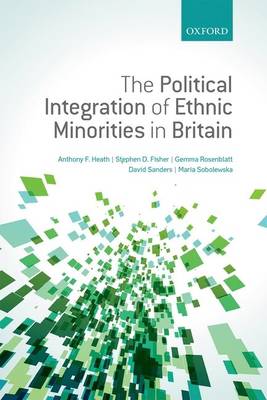
- Afhalen na 1 uur in een winkel met voorraad
- Gratis thuislevering in België vanaf € 30
- Ruim aanbod met 7 miljoen producten
- Afhalen na 1 uur in een winkel met voorraad
- Gratis thuislevering in België vanaf € 30
- Ruim aanbod met 7 miljoen producten
Zoeken
Political Integration of Ethnic Minorities in Britain
Anthony F Heath, Stephen D Fisher, Gemma Rosenblatt
Hardcover | Engels
€ 241,95
+ 483 punten
Omschrijving
Britain has become increasingly diverse over the last fifty years and she has been fortunate to attract relatively highly educated immigrants with democratic values and positive perceptions of the British political system. But Britain's ethnic minorities have suffered prejudice, harassment and discrimination, while politicians increasingly argue that they have failed to integrate adequately into British society and accuse them of leading separate lives. In this book we set out to explore the extent and nature of the political rather than the economic integration of Britain's growing ethnic minority population. We consider what ethnic minorities in Britain think about and how they engage in British politics. This includes political knowledge and interest, political values and policy preferences, perceptions of parties, preferences for parties, what parties offer ethnic minorities, electoral registration, turnout and vote choice, other forms of political participation (such as signing petitions and demonstrations) and trust in political institutions and satisfaction with the democratic system. The book considers the ways in which ethnic minorities resemble or differ from the white British population, and differences between different minority groups. The analysis is based on the largest and broadest academic survey ever of the political attitudes and behaviour of Britain's main ethnic minority groups, the 2010 Ethnic Minority British Election Study, in conjunction with the nationally representative British Election Study and other surveys. The findings are based on complex statistical regression models but they are presented and interpreted for more general readers. To what extent does discrimination at work and social exclusion alienate ethnic minorities from the political process? Are those minorities who associate more with those from their own ethnic group less engaged politically? Are those who were born in Britain better integrated than immigrants? This study addresses these and related questions. Despite there being many reasons for minorities to disassociate themselves from British politics they engage in positive and constructive ways. But there are important differences between the nature of white British and ethnic minority political engagement and between different minority groups, and especially between immigrants and their descendants. As a result politicians and political parties should not take the political support of ethnic minorities for granted.
Specificaties
Betrokkenen
- Auteur(s):
- Uitgeverij:
Inhoud
- Aantal bladzijden:
- 252
- Taal:
- Engels
Eigenschappen
- Productcode (EAN):
- 9780199656639
- Verschijningsdatum:
- 22/11/2013
- Uitvoering:
- Hardcover
- Formaat:
- Genaaid
- Afmetingen:
- 163 mm x 236 mm
- Gewicht:
- 521 g

Alleen bij Standaard Boekhandel
+ 483 punten op je klantenkaart van Standaard Boekhandel
Beoordelingen
We publiceren alleen reviews die voldoen aan de voorwaarden voor reviews. Bekijk onze voorwaarden voor reviews.








